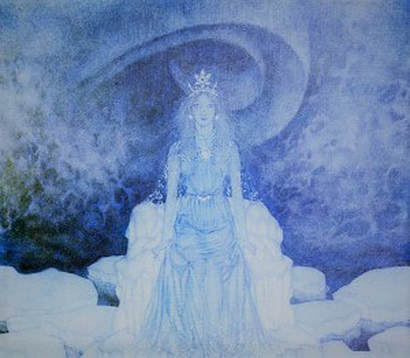|
by Steven Craig Hickman
La Sorcièreis one of the more reputable books on magic…
– Georges Bataille
Evil attracted them, almost overwhelmed them: without evil, their existence would have been … vacant. They were right, those ancient philosophers who identified fire with the principle of the universe, and with desire, for desire burns, devours, annihilates. At once agent and destroyer of beings, it is somber, it is infernal by essence.
– Emile Cioran
Thomas Ligotti in his famed short story “Medusa” will reiterate a refrain that is surely the leitmotif of all those dark and vitalistic counter-currents of the literature of evil and the philosophical peregrinations against which we comprehend those who know the true liberty of the rebel: “We may hide from horror only in the heart of horror.”1
Jules Michelet’s La Sorcière, originally published in Paris in 1862. A text that would fascinate certain of the late decadents and moderns. As he said of it: “The object of my book was purely to give, not a history of Sorcery, but a simple and impressive formula of the Sorceress’s way of life, which my learned predecessors darken by the very elaboration of their scientific methods and the excess of detail. My strong point is to start, not from the devil, from an empty conception, but from a living reality, the Sorceress, a warm, breathing reality, rich in results and possibilities.” (Michelet, p. 326) The Japanese anime Kanashimi no Belladonna would be inspired by this work and stage the erotic and violent enactments of a dark world of rape and rapacious vitalism. It follows the narrative of Michelet’s Sorceress and her resistance against feudalism and the Catholic Church which is fudged into that of Joan of Arc (Jeanne d’Arc), whom Belladonna’s Jeanne is revealed to be, and her execution by burning.
Georges Bataille would devote one of his essays in The Literature of Evil on Michelet and his work La Sorcière. In it he would show forth the true power of art as that ability to stage manage anxiety: the “arts … incessantly evoke these derangements, these lacerations, this decline which our entire activity endeavors to avoid” (p. 68).2 One is reminded of the poet Rimbaud who practices the “long, immense and reasoned deranging of all his senses” in order to reach a transcendent state, which he calls the “unknown.”3
Bataille in his discussion of sacrifice and its dark history in the human corruption of society and its criminal bonds would see it as the supreme form of excess and immanent transgression, a fusion and a degradation so compelling that all participants were united in the evil lust of sex and violence. Bataille would disagree with Michelet’s almost beneficent view of the Black Mass, the malefice sacrificial darkness that was the rapture of an infinite defilement. One Bataille would describe as an “unrecognized greatness of ritual defilement which symbolized a nostalgia for infinite defilement” (p. 72). We must remember this was the age of decadents, but also of the world of the naturalists; a time when both religion and the religion of Reason were still working their political, social, and personal disenchantments out through the literary circles of the day. “It is to Michelet’s credit to have accorded these nonsensical feasts the value due to them, ” says Bataille. Michelet was able to see the political anguish of the pagani, of peasants and serfs, victims of a dominant order, and a dominant religion.” (p. 72) Michelet was able to reach down into the lives of the neglected and abandoned, the dark hinterlands of the poor and outcast and pull them up into the realm of art where we could see these broken reflections as the dark face of our own beleaguered humanity. Michelet, a defender of women, of “exaltation of women and love”; a book that would at first find itself banned, and scandalized, only to finally be published by the Brussels Lacroix and Verboeckhoven – who, as Bataille reminds us published that great Book of Evil, Les Chants de Maldoror. (p. 73)
Bataille will align our need for the liberty of evil with excess and intensity, the need to go beyond the limits of social and human survival. He would provide an anecdote on Michelet who he felt never resolved the issue of evil’s intensity, and would impose limits to its excesses. Bataille relates that at times when Michelet was no longer feeling inspired and needed something to awaken his sense of evil he would walk the streets into the dark districts till he would come upon the stench of death, then he would breathe in deeply, having ‘got as close as possible to the object of disgust’, and return home to work. (p. 75) In a final note Bataille will relate: “I cannot but recall his face – noble, emaciated, with quivering nostrils.” (p. 75)
taken from:
0 Comments
Leave a Reply. |
Steven Craig Hickman - The Intelligence of Capital: The Collapse of Politics in Contemporary Society
Steven Craig Hickman - Hyperstition: Technorevisionism – Influencing, Modifying and Updating Reality
Archives
April 2020
|

 RSS Feed
RSS Feed
